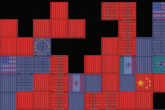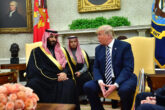May 03, 2020
The World Order Is Dead. Here’s How to Build a New One for a Post-Coronavirus Era.
International orders seldom change in noticeable ways. Just as Rome wasn’t built in a day, the Pax Romana was not a passing phase: it persisted for centuries. The order that arose from the 1815 Congress of Vienna didn’t fully unravel until the outbreak of World War I in 1914.
But at rare moments, confidence in the old order collapses and humanity is left with a vacuum. It is during these times that new orders are born—that new norms, treaties and institutions arise to define how countries interact with each other and how individuals interact with the world.
As the most far-reaching global disruption since World War II, the coronavirus pandemic is such a moment. The post-1945 world order has ceased to function. Under a healthy order, we would expect at least good faith attempts at international coordination to confront a virus that knows no borders. Yet the United Nations has gone missing, the World Health Organization has become a political football and borders have closed not only between countries but even within the European Union. Habits of cooperation that took decades to entrench are dissolving.
Read the full article in POLITICO Magazine.
More from CNAS
-
Game Over?
The trade wargame suggests that sustained high tariffs could create leverage and urgency to spur action toward a productive restructuring of the international trade system....
By Emily Kilcrease & Geoffrey Gertz
-
Middle East Security / Energy, Economics & Security
Trump Inks $600 Bn Deal In Saudi Arabia | Musk, Blackrock CEO Flank Trump In Gulf VisitIn today's episode of India Global, U.S. President Donald Trump secured a $600 billion commitment from Saudi Arabia on Tuesday to invest in the United States. NDTV's Gaurie Dw...
By Daniel Silverberg
-
Energy, Economics & Security / Technology & National Security
Tariffs and Tech: An Uncertain RecipeHigher tariffs could prompt American cloud companies to shift more of their capital investments abroad....
By Pablo Chavez
-
Trump Tariffs: How Will U.S. Plans Reshape the Global Economy?
Donald Trump says he's already decided the tariffs he will impose on countries that export goods to America, including the United Kingdom. Channel 4 hears from Emily Kilcrease...
By Emily Kilcrease




